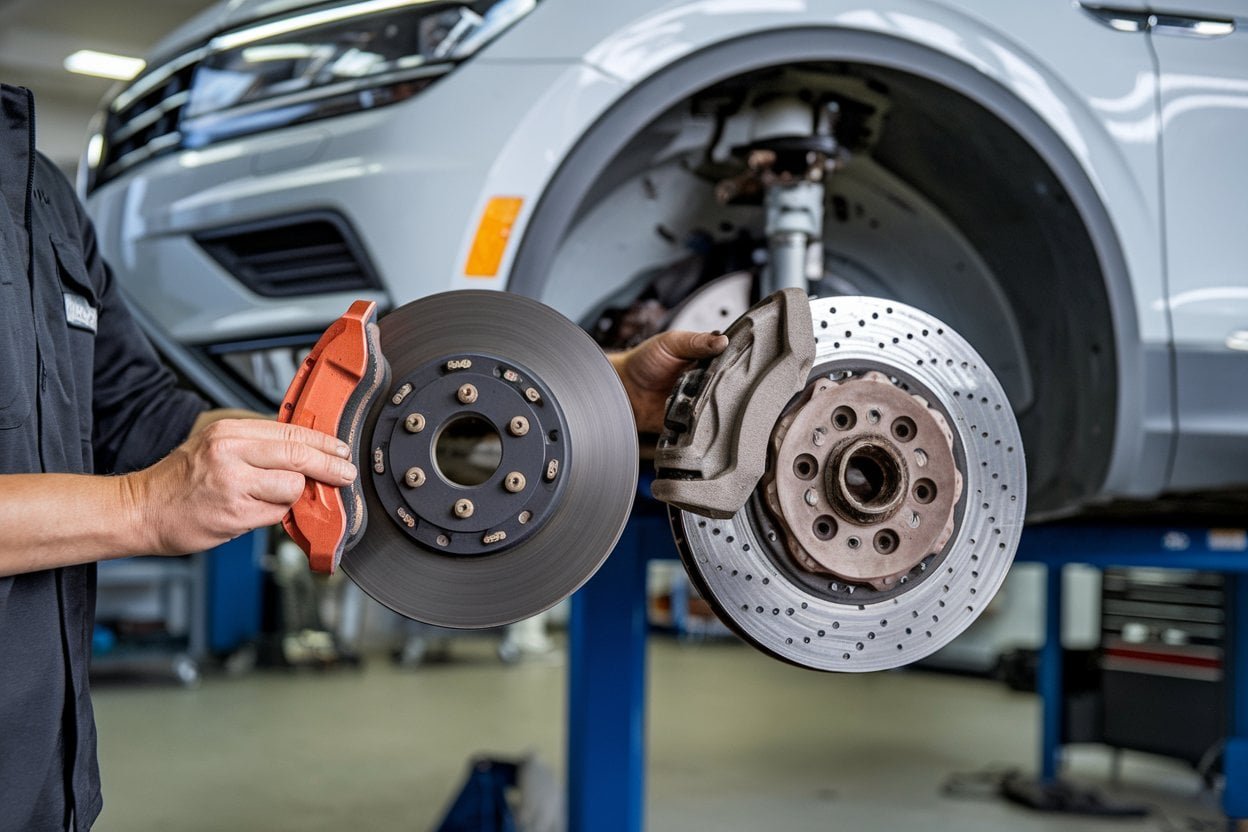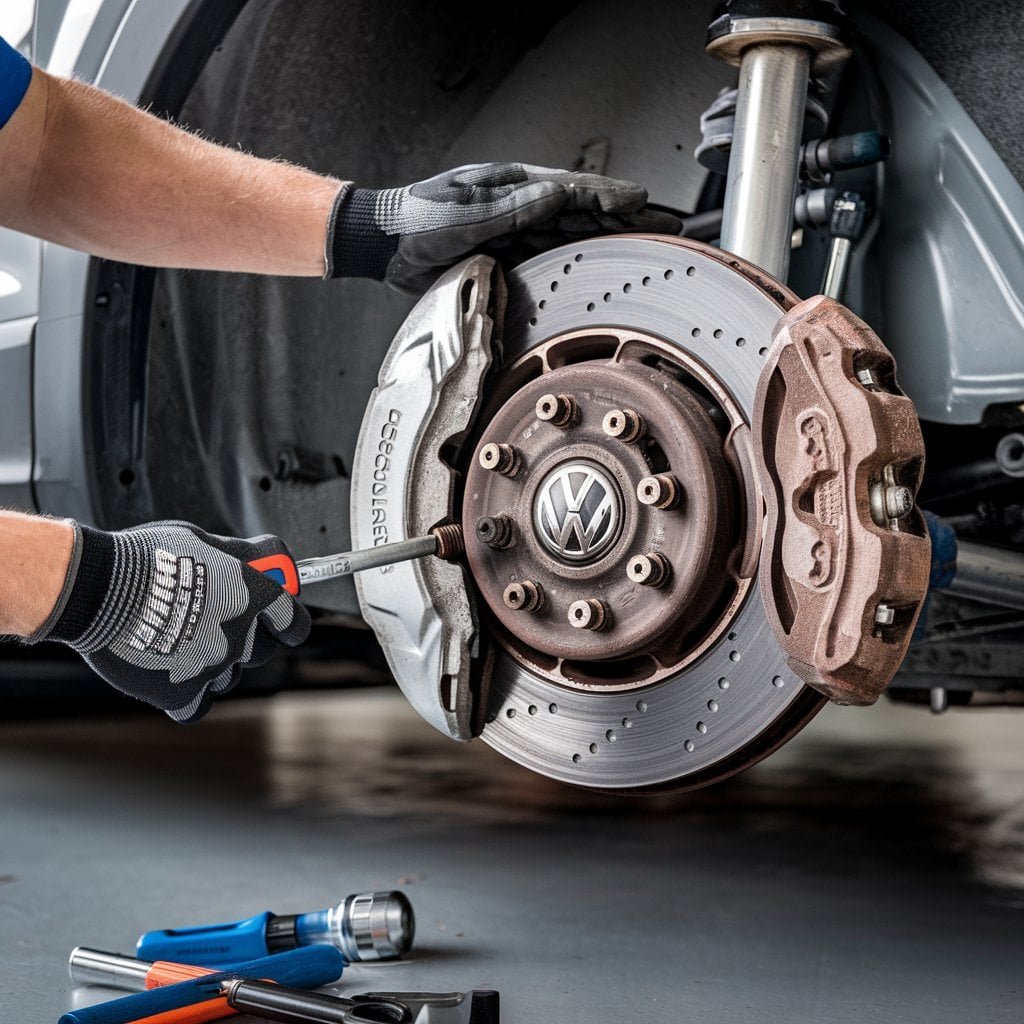Is your VW Tiguan taking longer to stop or making squeaky noises? Don’t ignore these warning signs—your brakes might be worn out! A timely VW Tiguan brake pad replacement prevents expensive rotor damage and ensures smooth braking, especially on Dubai’s congested roads. Most Volkswagen Tiguan brake pads need replacement every 40,000 to 60,000 km, but extreme heat and frequent braking in city traffic can wear them out faster. We use genuine VW brake pads for maximum safety and performance. Book your VW Tiguan brake pad replacement today and enjoy a 15% discount on labor charges!

The VW Tiguan braking system is designed for safety, efficiency, and durability, ensuring reliable stopping power in Dubai’s demanding driving conditions. Each component plays a crucial role in delivering smooth braking performance.
Is your VW Tiguan making strange noises or taking longer to stop? Your brake pads could be worn out, putting your safety at risk. Ignoring brake issues can lead to rotor damage, expensive repairs, and dangerous driving conditions. The VW Tiguan braking system is built for performance, but brake pads naturally wear down over time, especially in Dubai’s heavy traffic and extreme heat. Here are six clear warning signs that it’s time for a VW Tiguan brake pad replacement.
When your VW Tiguan brake pads wear down, a metal wear indicator scrapes against the rotor, creating a loud squealing sound every time you brake. This is an early warning sign that your pads need immediate replacement before they damage the rotors.
If you hear a deep grinding noise, your brake pads are completely worn out, and the metal backing plate is scraping against the rotors. This can cause severe rotor damage, leading to expensive repairs beyond just a VW Tiguan brake pad replacement.
If your VW Tiguan pulls to one side while braking, it means the brake pads on one side are more worn out than the other. This can happen due to stuck calipers or uneven braking force, requiring both pad replacement and a brake system check-up.
A pulsating or vibrating brake pedal indicates that the brake pads are worn unevenly or the rotors have developed deep grooves. If ignored, this can lead to weakened braking performance and unsafe stopping distances.
If your brake pedal feels unusually soft or spongy, it could mean the brake pads are severely worn down or there’s air in the brake lines. In some cases, it might also indicate a leak in the brake fluid system, which requires urgent inspection.
A strong, burning odor after braking, especially in Dubai’s hot weather, suggests that your brake pads are overheating due to excessive friction. This can lead to brake fade, reducing stopping power and making driving dangerous.
Ignoring worn-out brake pads can lead to brake failure and costly rotor damage. If you’ve noticed any of these signs, don’t wait—schedule your VW Tiguan brake pad replacement in Dubai today. For a limited time, get 15% off labor charges and ensure your vehicle stays safe on the road!

Knowing the right time for a VW Tiguan brake pad replacement helps maintain braking efficiency and prevents rotor damage. Unlike engine oil changes with fixed intervals, brake pad wear depends on driving conditions, habits, and climate—especially in Dubai’s extreme heat and heavy traffic.
Replacing VW Tiguan brake pads at the right time ensures smoother braking, better performance, and lower maintenance costs. If you’re approaching 40,000 km or experiencing weaker brakes, book a VW Tiguan brake pad replacement service in Dubai today and enjoy 15% off labor charges!
Looking for an affordable VW Tiguan brake pad replacement in Dubai? Replacing worn-out brake pads on time ensures smooth braking, prevents rotor damage, and avoids costly repairs. The cost of Volkswagen Tiguan brake pad replacement depends on genuine vs. aftermarket brake pads, labor charges, and additional services like rotor resurfacing.
We offer competitive pricing for Volkswagen Tiguan brake services, ensuring genuine parts and expert installation.
Book your VW Tiguan brake pad replacement in Dubai today and get 15% off labor charges! Ensure safe and smooth braking with our expert Volkswagen service. Contact us now for an appointment!
Several factors determine the final price of VW Tiguan brake pad replacement:
The Volkswagen Tiguan braking system is designed for smooth, reliable performance, but over time, certain issues can develop due to wear and tear, driving conditions, and lack of maintenance. Ignoring brake problems can lead to higher repair costs and compromised safety. Here are the most common VW Tiguan brake issues and their solutions.
Issue: One side of the VW Tiguan brake pads wears out faster than the other, leading to reduced braking efficiency and a pulling sensation when braking.
Causes:
Solution:
Issue: The brake pedal feels too soft or sinks to the floor, making it harder to stop the vehicle.
Causes:
Solution:
Issue: When applying brakes, the pedal vibrates or pulses, making braking unstable.
Causes:
Solution:
Issue: Brakes produce high-pitched squealing or grinding sounds when applied.
Causes:
Solution:
Issue: A strong burning odor coming from the brakes after applying them, especially on steep roads or in heavy traffic.
Causes:
Solution:
Issue: The brake system warning light stays on, signaling a brake issue that needs immediate attention.
Causes:
Solution:
Ignoring these common VW Tiguan brake issues can lead to dangerous driving conditions and costly repairs. If you notice brake noise, vibrations, or warning lights, get a professional brake inspection today. Book now and get 15% off labor charges on brake pad replacement!
Brakes feeling weak? Hearing that annoying squeal? Don’t wait until your VW Tiguan brake pads are completely worn out. Ignoring them can lead to rotor damage, unsafe braking, and expensive repairs. We use genuine Volkswagen brake pads to keep your Tiguan’s braking system working perfectly in Dubai’s heavy traffic and hot climate. Our expert technicians handle the job quickly, ensuring smooth and reliable braking. Get your VW Tiguan brake pad replacement done today and enjoy 15% off labor charges. Book your appointment now and drive with confidence!
Trust our team of Expert Volkswagen Mechanics at our Volkswagen Service Center in Dubai for all your Volkswagen Repair and service needs.
Our Top-Notch Volkswagen Service Center in Dubai have the advanced diagnostic tools and Volkswagen experts to accurately identify and resolve any issues with your Volkswagen.
With over 1200+ Volkswagen repaired, our Volkswagen Service Center in Dubai is the trusted Garage for comprehensive and expert Volkswagen Repair services.
Most of the vehicles get damaged just because of maintenance neglect you take
Uneven brake pad wear can be tricky to notice, but some clear signs include your Tiguan pulling to one side when braking, reduced braking efficiency, and inconsistent stopping power. This issue often happens due to stuck calipers, misaligned brake components, or poor-quality brake pads. If left unchecked, it can cause rotor damage and lead to costly repairs. A professional Volkswagen brake inspection can identify uneven wear and prevent further issues.
Yes, you can replace only the front or rear brake pads, depending on which set is worn out first. However, for balanced braking, it’s recommended to replace brake pads in pairs on the same axle (both front or both rear). In most cases, front brake pads wear out faster since they handle more braking force. If your rear pads still have good thickness, replacing just the front set is fine. A technician can assess whether both sets need replacement.
Yes, after a VW Tiguan brake pad replacement, you might notice a slightly different pedal feel or that the brakes don’t grip as sharply at first. This is due to the bedding-in process, where the new pads need to wear down slightly to match the rotor surface. It usually takes about 200 to 300 km of driving for the new pads to fully settle. During this period, avoid hard braking to ensure even wear.
Not necessarily. If your brake rotors are still in good condition, they don’t need to be replaced. However, if they are scored, uneven, or below the minimum thickness, they should be resurfaced or replaced. Using new brake pads on damaged rotors can lead to uneven pad wear, vibrations, and reduced braking performance. A professional brake inspection will determine if the rotors need resurfacing or full replacement.
For the best performance and durability, always go for OEM Volkswagen brake pads. These are specifically designed for the VW Tiguan’s braking system and offer better stopping power, longevity, and heat resistance. Aftermarket brake pads may be cheaper, but they often wear out faster, cause noise issues, and may not provide optimal braking performance. If you drive in Dubai’s extreme conditions, ceramic or semi-metallic OEM brake pads are the best choice.
Brake fluid is just as important as brake pads and rotors. Over time, it absorbs moisture and contaminants, reducing braking efficiency. Volkswagen recommends a brake fluid check every 10,000 km and a full brake fluid flush every 40,000 km or every 2 years. If your brake pedal feels soft, takes longer to stop, or the brake fluid looks dark or dirty, it’s time for a brake fluid replacement.
It’s not recommended. The brake warning light can indicate low brake fluid, worn-out brake pads, or an ABS system issue. If the light comes on, it’s best to get a brake inspection immediately to avoid potential brake failure. Driving with the warning light on can put you at risk, especially in Dubai’s high-speed highways and stop-and-go traffic.
“Talk to a Volkswagen Expert Now by booking a call, and get personalised solutions for your Volkswagen unique needs and requirements.”
+971564646081
